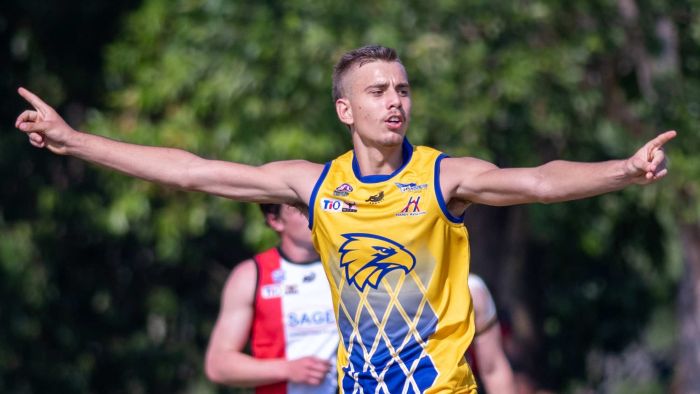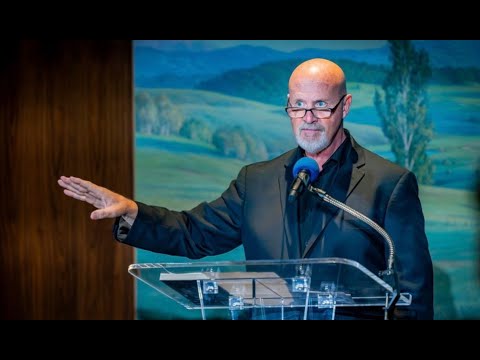Northern Territory product Joel Jeffrey is set to become the first footballer to get a brain scan before his playing career starts in an attempt to track any damage from concussions.
Key points:
- The Suns, who are expected to recruit Jeffrey, have agreed to allow intensive brain profiling of the 18-year-old
- A number of AFL players have retired early due to concussions
- One expert says tracking the effects of pro football in real time, rather than after the fact, could be a game changer
The Gold Coast Suns, who are tipped to recruit Jeffrey, have been approached to allow the 18-year-old to undergo intensive brain profiling, according to player manager and long-time concussion research advocate Peter Jess.
Joel Jeffrey, who has no existing brain issues, will undergo annual scans to track any changes to his brain as his career progresses and when it finishes, as part of an ongoing study into the effects of concussion.
Melbourne neurophysiologist and sports-related concussion expert Alan Pearce, who will conduct the detailed analysis of Jeffrey’s brain, backed the clinical testing.
“From a scientific perspective it’s great because we’ve never really had an opportunity to look at players prospectively,” said Dr Pearce, who has been researching how an athlete’s brain functions after concussion for more than a decade.
“All our research at the moment is looking backwards or retrospectively with players who have finished their career or they’ve had a number of concussions and they’re not recovering, so we’re really limited in whether it’s the concussion itself or if there are other factors that we can’t explain.
Dr Pearce said researchers would compare the findings from the initial scan to analysis throughout Jeffrey’s career to track any changes or deterioration, particularly if he suffered a concussion.
“The AFL’s concussion management policy and procedures have improved significantly over the last five years, but they’re still very limited by symptoms as the marker for a player being recovered,” he added.
“So in other words if a player reports they have no symptoms, if a doctor examines the player and can see they have no symptoms, then they’re cleared to play.
“But what we’re seeing in the research worldwide … is that symptom recovery doesn’t necessarily equal brain recovery.”
More players retiring due to concussions
Jeffrey’s father, former AFL player Russell, hopes the move will set a precedent for the competition.
“From a parent’s point of view it’s just another health check really and one that we know has never been done,” said the former coach and AFL administrator who played 50 games for St Kilda and the Brisbane Bears between 1987 and 1992.
“I would love to see it become a precedent and I think if that happens it would give a lot of comfort to the player and their parents that the wellbeing of your child is being looked after, whether that’s physical or mental.
“It’s really, really important.
“I think with so many players retiring at such a young age now because of consecutive concussions, and very little research being undertaken in terms of what that looks like post their careers, it’s really about education more than anything else.”
On Monday, West Coast delisted 22-year-old premiership player Daniel Venables, who has been unable to take to the field since last year, when he suffered significant brain trauma and ongoing concussion-related problems after a collision.

The club said it would try to facilitate a return to the Eagles should Venables be medically cleared to play again.
Former Melbourne and Gold Coast defender Kade Kolodjashnij was forced into an early retirement last month at the age of 25, revealing a tough battle after repeated head knocks.
AFL concussion test policy ‘dangerous’
The AFL says more players are missing more games due to concussion (eight matches missed per club per season in 2019 compared to 5.4 in 2018) because of a more conservative management approach.
A more strict policy introduced earlier this year mandates that players must pass a concussion test five days before a game to be able to return to play.




But the return to play protocols in place are dangerous, according to Peter Jess.
“The window of vulnerability for players is up to 28 days after the initial concussive event, and that’s a clinical concussion,” he said.
“The most dangerous part of our game is the sub-clinical concussion where the player doesn’t present with the symptoms, yet he is suffering a mild trauma.”
Jess said brain health was just as important as physical health.
“If you can manage the outcomes at the earliest possible moment you mitigate the damage, in some cases from the acute to the mild,” he said.
“So it’s really important to have rapid point-of-care diagnostic tools that actually diagnose sub-clinical concussions and then treat and rehabilitate.”
In September, Jess backed former AFL player Shaun Smith, who won an historic $1.4 million insurance payout for damage caused by repetitive head knocks while playing in the late 80s and 90s.
Jess said building a “compelling” body of evidence through the ongoing brain scans could help prove a legitimate compensation claim for Jeffrey if it came to that.
“As an agent I would be negligent if I didn’t do that, because in Australia we are the only first-world country that does not have a workers compensation program for its sports people,” he said.







